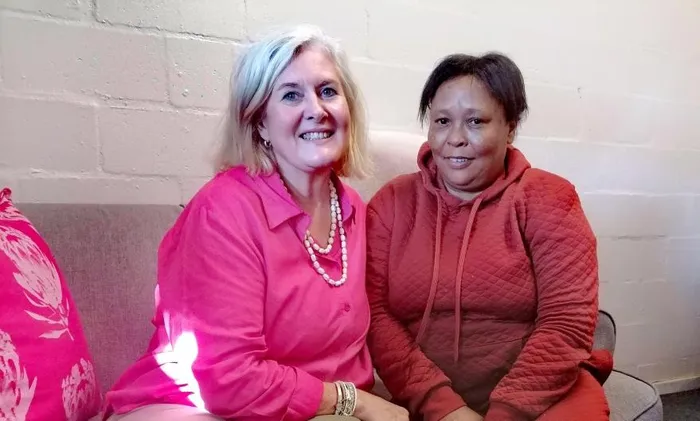Rape Crisis workshops raise awareness and provide support
Rape Crisis Cape Town Trust (RCCTT) wants more people to take advantage of their free community workshops.
The non-profit organisation's workshops aim to spread awareness about sexual violence and rape, how to report it and how to overcome it, said training and development coordinator and counsellor, Michelle Bergh.
They also share information about services offered by various by RCCTT branches in Athlone, Observatory and Khayelitsha.
Topics include debunking myths and social norms,sexual reproductive health for rape survivors, information about Thuthuleza Care Centres and the services they offer, and the pathway of the justice system.

Rape Crisis Athlone's training and development coordinator, and counsellor Michelle Bergh, left, with volunteer counsellor Eileen Daniels.
Image: Nabeelah Mohedeen
Ms Bergh said many women still didn't know about the RCCTT, at a time when "sexual assault in South Africa could be considered a pandemic".
She said it was difficult to say whether sexual assault in the country increased or decreased because the statistics showed which assaults were reported but not how many assaults actually happened.
To book a community workshop, an individual or organisation who wanted to host it would need to gather about 20 people to attend, and book a suitable venue. RCCTT would provide the educational material and facilitators.
Ms Berg said many women still didn't report sexual crimes because of the secondary victimisation they experienced from first responders such as those at police stations, religious fraternities, hospitals, clinics, courts, or from community leaders, family, and friends.
She said this needed to stop. A woman had the right to not lay a charge until she was ready, but had to remember that a rape kit needed to be completed within 72 hours of the assault for it to be admissible in court.
She said that one astonishing fact was that women were mostly assaulted by people that they knew. Myths including "what you wore, what time you went out, taking an Uber alone, were you drinking?" all needed to be debunked, because that was also secondary victimisation.
"The perception that we tell our daughters about this 'boogey man out there that is a stranger that will hurt them', is not really true because while we teach 'stranger danger', women are mostly raped by people that they know, people they work with, share homes with, break bread with, people in their communities."
Ms Bergh said women left the workshops feeling empowered and informed.
RCCTT offers 12 free counselling sessions for victims of sexual assault. The organisation also offers talks at schools and offers a Peer Educators Programme called the "Birds and Bees" project, which teaches leadership and how pupils can challenge rape culture as well as building a culture of consent in their schools.
In addition, pupils can learn how to write up a CV, apply to tertiary education facilities, public speaking, and more. RCCTT also offers workshops such as "Prevention of Sexual Harassment in the Workplace" at at fee.
Support is onoing. "We will never not see someone after their 12 sessions, I have a few people I see every five years. The important message we want to get out there is Rape Crisis is here to help. We are happy to be where we're needed," she said.
Rape Crisis also offers these workshops to businesses, colleges and universities, at a fee. For more information call the Rape Crisis 24-hour counselling helpline on 021 447 9762, and to book a community workshop call 021 684 1180.